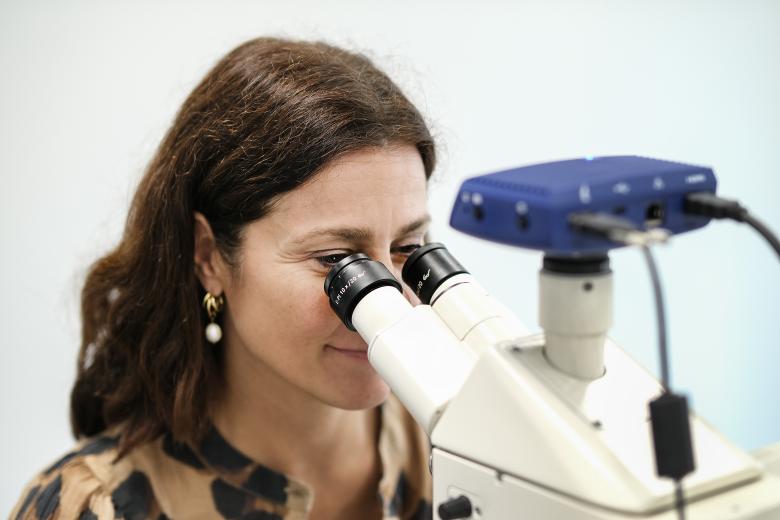"Our status as data experts has grown globally."
Nationally, the researchers from Andre Dekker's team have long been seen as the experts in the field of data in healthcare, Artificial Intelligence (AI), and federated deep learning. Thanks to their increasingly advanced image analyses and the now fully operational Personal Health Train, this team also put themselves on the global data map in 2022. Consequently, Andre is no longer surprised by receiving assignments from the Indian government, the EU, or the UN. Mention a major international data project in healthcare, and the chances are high that Andre Dekker and his team are involved in it.
Four European grants
“Our status has indeed grown significantly in 2022," says Andre. "We especially notice this when it comes to securing European grants. Often, these are prestigious projects where you only have about a 10% chance of winning the contract. In 2022, we secured four major grants, which is truly a record. The projects focus on breast cancer, cancer in adolescents, and arthritis. The third project shows that other fields - beyond oncology - have discovered us as well. With the fourth project, we aim to enable patients to make their data suitable for international sharing, thereby making even more data available for research."
Successful year
"In addition, together with radiotherapist-oncologist Stéphanie Peeters, we have received significant funding from the Hanarth Fund for research on the use of AI in breast cancer. And we haven't even mentioned the projects funded by the National Growth Fund and the assignments in which Maastricht UMC+ contributes financially. More and more departments at Maastricht UMC+ are recognizing the importance of data and are willing to pay for their own data science specialist from our team."
Valuable expertise
"The fact that other parties are willing to pay for our services indicates that the perception of data science has changed. Not too long ago, we had to 'beg' for data. It cost hospitals time and effort without them seeing immediate results. Now, it is becoming increasingly clear that we bring valuable expertise that they can benefit from as well. As a result, we are being asked more and more to share that expertise. Not only with doctors but, for example, also with the RSO: the regional collaborative organization that coordinates the construction of a regional data infrastructure for healthcare. In our advice, we strongly advocate for the reuse of data in multiple research projects and for more synergy between clinical data and data research."
Setting the agenda
"We do this not only regionally but also nationally, in advisory roles with the Dutch AI Coalition and the Ministry of Health, Welfare, and Sport (VWS). Internationally, we collaborate with the EU on a new European cancer vision. We are contributing to a new guideline for AI in healthcare for the United Nations. Additionally, we are assisting the world's largest cancer institute - the MD Anderson Cancer Center in the United States - in establishing a data science institute for oncology. I could go on like this for a while. Our expertise is becoming increasingly visible, allowing us to play a significant role in shaping the international agenda concerning healthcare data."
50 experts in-house
"Just to clarify, this status doesn't grow solely thanks to me. It's an achievement of our entire group. We now have over fifty people on our team. Recently, we had one job opening, and more than seventy-five data specialists from all over the world applied for it. So, we have the luxury of selecting the very best experts, which further enhances our reputation. However, that's not the ultimate goal. We are simply dedicated to our profession, and all this growth is happening naturally."
Personal Health Train stops at twenty stations
The Personal Health Train is an innovative way to analyse information from other institutions around the world without the need to share sensitive data. Developed by Andre Dekker, this train now travels along 20 major hospitals and radiotherapy centers in Europe, the United States, China, Brazil, and India to analyse data and scans. The result of such an analysis could be an AI model that is much better at outlining a lung tumor than any human could ever be. Thanks to AI, that tumor can be precisely targeted for radiation treatment, with even fewer side effects. The Personal Health Train also enables the construction of data models for various other diseases, including Alzheimer's and Parkinson's. More and more international hospitals are offering their data for free, expanding the reach of the Personal Health Train even further.
This article was previously published in the annual report 2022 of Maastro.
Also read
-
Fresh air
Newly appointed professor Judith Sluimer (CARIM) talks about oxygen in heart functioning and the 'fresh air' the academic world needs.

-
GROW research: all-in-one test for genetic defects in embryos🧪
Researchers at Maastricht UMC+ and GROW have developed a technique that can analyse the entire genome in a single test, allowing for faster determination of embryos suitable for successful pregnancy.

-
Prestigious European grant for three UM researchers
Three researchers from Maastricht University (UM) will receive a prestigious ERC Starting Grant from the European Research Council. They will receive €1.5 million each. Their funding is part of the EU Horizon Europe programme.
